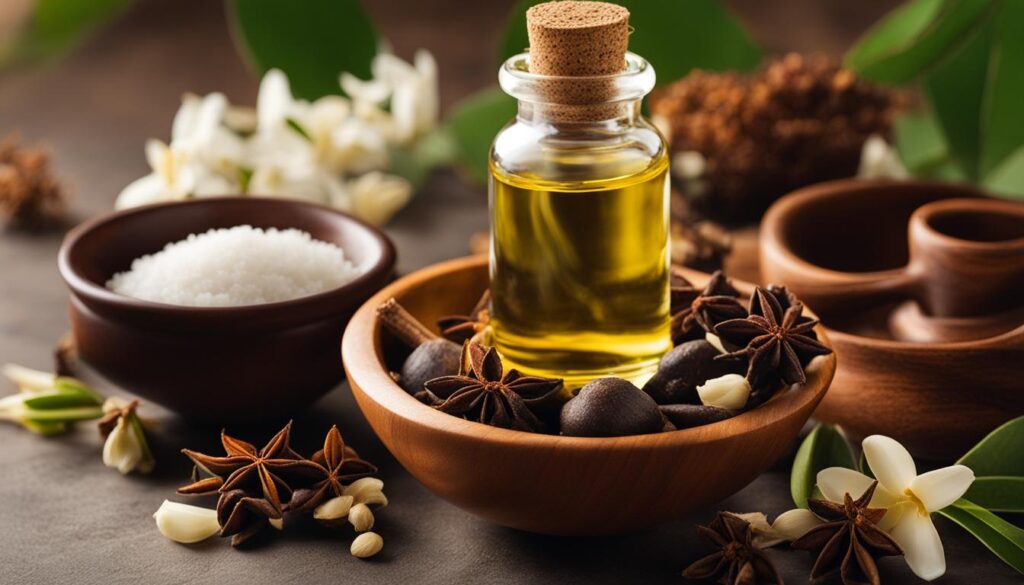Clove oil is a versatile essential oil that offers numerous uses and benefits. Derived from the clove tree native to Southeast Asia, this oil has been treasured for centuries for its antimicrobial properties, pain-relieving effects, and digestive benefits.
In this article, I will explore the various uses and benefits of clove oil. From its effectiveness in treating toothaches and acne to its benefits for hair, skin, and digestion, clove oil has a wide range of applications. I will also provide guidance on how to use clove oil safely and effectively for aromatherapy.
But first, let’s delve into the fascinating history and origin of clove oil.
Key Takeaways:
- Clove oil is derived from the clove tree and offers antimicrobial, pain-relieving, and digestive benefits.
- Clove oil can be used to treat toothaches, acne, and various hair and skin conditions.
- It is important to use clove oil safely and effectively for aromatherapy.
History and Origin of Clove Oil

Clove oil has a fascinating history that dates back centuries. It has been an integral part of traditional medicine practices, particularly in Ayurveda and Chinese medicine. The origin of clove oil can be traced back to the clove tree, scientifically known as Syzygium aromaticum, which is native to Indonesia and Southeast Asia.
The clove tree is an evergreen tree that belongs to the Myrtaceae family. It grows up to 12 meters in height and produces aromatic flower buds, leaves, and stems that are used to extract clove oil. The oil is obtained through a process called steam distillation, where the plant material is heated to release the essential oil.
There are two main types of clove oil: clove bud oil and clove leaf oil. Clove bud oil is derived from the flower buds of the clove tree and is known for its strong scent and higher potency. On the other hand, clove leaf oil is extracted from the leaves of the tree and is milder in fragrance, making it safer for topical applications.
The Versatility of Clove Oil throughout History
“Clove oil has been utilized for various health concerns throughout history, ranging from dental issues to digestive problems. It has long been revered for its medicinal properties and is deeply woven into the tapestry of traditional medicine.”
Clove oil was highly valued in ancient civilizations for its diverse therapeutic properties. It was used in Ayurveda to address toothaches, dental decay, and gum inflammation. In Chinese medicine, it was employed to aid digestion, alleviate nausea, and promote overall wellness.
Explorers and traders from Europe soon discovered the benefits of clove oil and its medicinal value. They brought it back home, where it quickly gained popularity as a natural remedy for various ailments and as a culinary spice.
Today, clove oil continues to be celebrated for its antimicrobial, anti-inflammatory, and analgesic properties. Its rich history and origins have laid the foundation for the modern usage and understanding of this versatile essential oil.
| Type | Main Characteristics | Applications |
|---|---|---|
| Clove bud oil | Strong scent, higher potency | – Dental care – Digestive health – Aromatherapy – Topical use with caution |
| Clove leaf oil | Milder scent, safer for topical application | – Skincare – Household uses – Aromatherapy – Topical use |
As we delve deeper into the properties and benefits of clove oil, we will explore its key components, its natural applications, and the various ways it can be incorporated into daily life.
Properties and Key Components of Clove Oil

Clove oil possesses a range of beneficial properties and contains key components that contribute to its therapeutic effects. One of the primary components found in clove oil is eugenol, which not only gives the oil its distinctive aroma but also contributes to its antimicrobial, anti-inflammatory, and analgesic properties.
Eugenol has been the subject of numerous studies highlighting its potential health benefits. It has shown promise in combatting infections, reducing pain, and even improving immune function. Furthermore, clove oil contains other important components such as acetyleugenol, beta-caryophyllene, and alpha-humulene, each with their own unique properties that contribute to the overall efficacy of the oil.
“Eugenol, a key component of clove oil, exhibits antimicrobial, anti-inflammatory, and analgesic properties.”
“The presence of acetyleugenol, beta-caryophyllene, and alpha-humulene contributes to clove oil’s therapeutic benefits.”
These various components work together synergistically to provide the desired therapeutic effects of clove oil. Whether it’s the antimicrobial properties combating infections or the analgesic properties reducing pain, the combination of these key components makes clove oil a valuable natural remedy.
To better understand the properties and key components of clove oil, refer to the table below:
| Components | Properties |
|---|---|
| Eugenol | Antimicrobial, anti-inflammatory, analgesic |
| Acetyleugenol | Antifungal, antioxidant |
| Beta-caryophyllene | Anti-inflammatory, antioxidant |
| Alpha-humulene | Anti-inflammatory, sedative |
The presence of these key components in clove oil contributes to its overall therapeutic efficacy, making it a popular choice for various health and wellness applications.
Natural Usage of Clove Oil
In addition to its medicinal uses, clove oil has a wide range of natural applications. Let’s explore some of the ways you can incorporate clove oil into your daily life:
Culinary Uses
Clove oil is a versatile ingredient that can add a unique flavor and aroma to your culinary creations. Its warm and spicy notes make it a popular addition to both sweet and savory dishes. Here are some culinary uses for clove oil:
- Enhance the flavor of meat marinades and rubs
- Add a hint of clove to baked goods, such as cookies, cakes, and breads
- Create flavorful spice blends for curries, stews, and soups
- Infuse oils and vinegars with clove for salad dressings and marinades
Personal Care Products
Clove oil’s antimicrobial and soothing properties make it a popular ingredient in personal care products. Whether you’re looking for oral hygiene solutions or skincare remedies, clove oil can provide natural benefits. Here are some ways you can incorporate clove oil into your personal care routine:
- Use toothpaste and mouthwash containing clove oil for oral health benefits
- Add a few drops of clove oil to your bathwater for a relaxing and aromatic experience
- Look for skincare products, such as creams and lotions, that contain clove oil for its antimicrobial and anti-inflammatory effects
Household Uses
Clove oil’s antimicrobial properties make it an excellent natural cleaner and disinfectant for your home. Here are some household uses for clove oil:
- Create an all-purpose cleaning spray by combining clove oil with water and vinegar
- Add a few drops of clove oil to your laundry detergent to freshen up your clothes
- Use a cloth dampened with clove oil to wipe down surfaces and eliminate germs
Topical Applications
Clove oil has analgesic, anti-inflammatory, and antifungal properties, making it a valuable addition to your topical remedies. Here are some ways you can use clove oil for its therapeutic benefits:
- Mix clove oil with a carrier oil, such as coconut oil, and apply it to sore muscles and joints for pain relief
- Dilute clove oil with a carrier oil and use it as a natural remedy for skin conditions, such as acne or fungal infections
- Add a few drops of clove oil to your favorite massage oil for a soothing and aromatic massage experience
By exploring the natural uses of clove oil, you can harness its many benefits in your daily life, from the kitchen to your personal care routine and household cleaning. Remember to always follow proper dilution guidelines and consult a healthcare professional if you have any specific concerns or medical conditions.
Clove Oil Benefits and Applications

Clove oil, with its antimicrobial, analgesic, and anti-inflammatory properties, offers a wide range of benefits and applications. Its efficacy against bacteria, fungi, and yeasts makes it a valuable natural remedy for various purposes.
- Dental Uses: Clove oil has long been utilized in dental care to relieve toothache pain, prevent dental erosion, and ease oral conditions like teething in infants. Its soothing properties provide temporary relief and promote oral health.
- Skin Applications: When applied topically, clove oil can alleviate skin irritation, promote healing, and reduce itching. Its anti-inflammatory and antimicrobial effects make it beneficial for various skin conditions.
- Anticancer Properties: Research has shown that clove oil may exhibit anticancer properties by inhibiting the growth of cancer cells and inducing cell death. Though further studies are needed, these findings offer promising potential for future cancer treatments.
With its versatile benefits, clove oil proves to be a valuable addition to your natural healthcare and wellness routine. Whether it’s for dental care, skincare, or potential anticancer effects, clove oil offers a natural alternative for various health concerns.
Stay tuned for the next section, where we will explore essential tips and precautions for using clove oil effectively and safely.
Usage Tips and Cautions for Clove Oil

When it comes to using clove oil, it’s important to follow some essential tips to ensure safe and effective application. Here are some usage tips and cautions to keep in mind:
Dilution:
Clove oil is highly concentrated and potent, so it should always be diluted before use. Mix a few drops of clove oil with a carrier oil, such as coconut oil or almond oil, to reduce the risk of skin irritation or sensitivity. The general guideline for dilution is 1-3 drops of clove oil per teaspoon of carrier oil.
Topical Application:
Clove oil can be applied topically to the skin after dilution. It’s important to perform a patch test on a small area of skin before using it on larger areas to check for any adverse reactions. Avoid applying clove oil directly to the gums or oral tissues, as it may cause sensitivity or irritation.
Aromatherapy and Inhalation:
If using clove oil for aromatherapy purposes, it can be used in a diffuser or directly inhaled from the bottle. Inhaling the aroma of clove oil can promote relaxation and provide stress relief. However, it’s essential to use the oil in moderation and avoid prolonged inhalation, as excessive exposure to the scent may cause dizziness or headaches.
Sensitivity and Allergies:
Some individuals may be more sensitive to clove oil than others. If you experience any skin irritation, redness, or itching after using clove oil, discontinue use immediately and seek medical advice. People with known allergies to spices or essential oils should exercise caution and consult with a healthcare professional before using clove oil.
Drug Interactions:
It’s important to be aware of potential drug interactions when using clove oil. Certain medications, such as anticoagulants or blood thinners, may interact with clove oil and increase the risk of bleeding or bruising. If you’re taking any medications or have any underlying health conditions, it’s advisable to consult with a healthcare professional before using clove oil.
Side Effects:
While clove oil is generally safe when used properly, excessive use or ingestion of undiluted clove oil may cause side effects. These can include mouth or throat sores, nausea, vomiting, abdominal pain, dizziness, or difficulty breathing. If any of these symptoms occur, seek immediate medical attention.
By following these usage tips and cautions, you can safely and effectively incorporate clove oil into your routine and enjoy its many benefits.
Selecting the Best Quality Clove Oil

When it comes to purchasing clove oil, ensuring the best quality is essential for reaping its full benefits. Here are some key factors to consider:
- Scientific Name: Look for the scientific name Syzygium aromaticum on the label to confirm its authenticity.
- Purity Statement: Seek a purity statement that guarantees the oil is 100% clove essential oil without any additional ingredients.
- Avoid Marketing Hype: Be cautious of extravagant claims and marketing hype surrounding clove oil. It’s important to remember that essential oils are not regulated by the FDA.
- Dark Glass Bottle: Choose clove oil that is packaged in a dark glass bottle. This helps protect the oil from light damage, which can degrade its quality over time.
By keeping these factors in mind, you can ensure that you are purchasing the best quality clove oil for your needs.
Comparing Quality Factors of Clove Oils
| Quality Factor | Recommended | Not Recommended |
|---|---|---|
| Scientific Name | Syzygium aromaticum | Generic or incorrect names |
| Purity Statement | 100% clove essential oil | Incomplete or ambiguous statements |
| Marketing Hype | Transparent and accurate information | Extravagant or unsupported claims |
| Packaging | Dark glass bottle | Clear or plastic containers |
Proper Storage of Clove Oil

To maintain the quality and effectiveness of clove oil, it is important to store it properly. Proper storage ensures that the oil remains fresh and retains its therapeutic properties for an extended period of time.
Clove oil should be stored in a cool and dark place, away from direct sunlight and heat sources. Exposure to light and heat can degrade the oil and reduce its potency. By keeping it in a cool and dark place, you can preserve the quality of clove oil for longer.
Storing clove oil in a cool environment helps to prevent oxidation and maintain its chemical stability. High temperatures can cause the oil to evaporate quickly and alter its composition, diminishing its effectiveness.
Moreover, exposing clove oil to direct sunlight can lead to photochemical reactions that degrade its quality. UV rays can break down the oil’s molecules and reduce its therapeutic benefits.
In addition, it is advisable to store clove oil in a dark-colored glass bottle. The dark glass helps to further protect the oil from light damage, ensuring that it remains potent and effective.
Benefits of Proper Storage
Properly storing clove oil offers the following benefits:
- Preserves the oil’s potency and therapeutic properties
- Prevents degradation from exposure to light and heat
- Ensures the oil remains fresh for an extended period of time
- Maintains the chemical stability of the oil
- Increases the shelf life of clove oil
By taking the necessary precautions and storing clove oil in a cool and dark place, you can maximize its effectiveness and reap its various benefits for a longer duration.
Clove Oil Uses in Aromatherapy

Clove oil is a popular choice for aromatherapy due to its aromatic scent and its ability to promote relaxation and stress relief. The captivating aroma of clove oil creates a soothing ambiance that can help calm the mind and body.
Inhaling the scent of clove oil has been found to have a positive impact on mood and emotions, reducing feelings of anxiety and promoting a sense of well-being. The delightful fragrance can help create a tranquil environment, making it an excellent choice for relaxation.
To experience the benefits of clove oil in aromatherapy, there are several methods you can try:
- Diffusion: Add a few drops of clove oil to a diffuser, allowing the fragrance to disperse throughout the room.
- Inhalation: Take deep breaths directly from the bottle of clove oil to enjoy its aromatic scent and promote relaxation.
- Bath Time: Add a few drops of clove oil to your bathwater for a soothing and aromatic experience.
- Massage: Dilute clove oil with a carrier oil, such as sweet almond or jojoba oil, and use it during a relaxing massage.
Whether diffused, inhaled, added to bathwater, or used for massage, clove oil can be a valuable addition to your aromatherapy routine, providing a calming and serene atmosphere to promote relaxation and stress relief.
Quote:
“The aromatic scent of clove oil in aromatherapy is like a gentle embrace, enveloping you in tranquility and helping you find inner peace.” – [Author Name]
Clove Oil for Dental Care
One of the primary uses of clove oil is in dental care. It has long been used to provide temporary relief from toothache pain and can help prevent dental erosion. Applying clove oil to the affected tooth can numb the nerves and provide relief for a few hours. It is important to note that clove oil should be used under the guidance of a qualified dental professional and should not replace professional dental care. Proper dental hygiene practices, such as regular brushing and flossing, should still be followed.
Clove Oil for Skincare
Clove oil is known for its numerous benefits in skincare, thanks to its antimicrobial and anti-inflammatory properties. It can effectively provide relief from skin irritations, treat acne, and promote wound healing. The natural remedy offers a holistic approach to skincare, with minimal side effects compared to harsh chemical-based products.
When using clove oil for skincare, it is crucial to dilute it properly to avoid skin irritation. Mixing it with a carrier oil, such as almond or coconut oil, can help prevent any potential adverse reactions. Conducting a patch test before applying it to larger areas of the skin is also essential to ensure skin compatibility.
Clove oil can provide relief from various skin irritations, including rashes, itching, and redness. Its antimicrobial properties help combat bacteria and fungi, reducing the risk of infection. Regular use of clove oil can also assist in treating acne, thanks to its ability to control oil production and reduce inflammation.
“Clove oil has been a game-changer for my acne-prone skin. It not only helps in reducing breakouts but also calms down the existing inflammation. I love using it as a spot treatment!” – Sarah, Skincare Enthusiast
In addition to its antimicrobial and anti-inflammatory benefits, clove oil’s wound healing properties make it an excellent natural remedy for minor cuts, scrapes, and burns. Its analgesic properties provide relief from pain and discomfort while promoting faster healing. Remember to apply the oil to clean, dry skin and cover the wound with a sterile dressing to prevent infection.
While clove oil offers several skincare benefits, it is essential to consult with a dermatologist before incorporating it into your skincare routine, especially if you have any specific skin concerns or conditions. They can guide you on the appropriate usage and help ensure optimal results.
Clove Oil for Digestive Health
Clove oil is a natural remedy that can provide relief for a range of digestive issues and promote overall digestive health. Known for its soothing effect on the digestive system, clove oil can help alleviate indigestion, gas, and bloating. By improving digestion, reducing inflammation, and calming the stomach, clove oil can offer much-needed relief for those experiencing digestive discomfort.
There are two main ways to use clove oil for digestive health. First, it can be consumed orally by diluting a few drops in a beverage or incorporating it into culinary preparations. This allows the beneficial properties of clove oil to directly affect the digestive system. Alternatively, clove oil can be applied topically to the abdomen for localized relief. This can help ease discomfort and promote a sense of well-being.
While clove oil offers many benefits for digestive health, it is important to seek professional advice before incorporating it into your routine. Consulting with a healthcare provider or a qualified professional can ensure that clove oil is suitable for your specific needs and conditions. They can provide personalized guidance on the appropriate dosage, usage, and potential interactions with other medications or supplements.
In conclusion, clove oil is a natural remedy with a soothing effect on the digestive system. It can be used to alleviate indigestion, gas, and bloating by improving digestion, reducing inflammation, and calming the stomach. Whether consumed orally or applied topically, clove oil offers a gentle and effective solution for digestive discomfort. Remember to consult with a healthcare professional before using clove oil to ensure its safety and efficacy for your individual needs.
FAQ
What are the uses and benefits of clove oil?
Clove oil has various uses and benefits, including its effectiveness in treating toothaches, acne, and hair and skin conditions. It is also beneficial for digestion and pain relief. Additionally, it can be used for aromatherapy.
Where does clove oil come from?
Clove oil is derived from the clove tree, which is native to Southeast Asia, particularly Indonesia. It is extracted through steam distillation from the buds and leaves of the tree.
What are the properties and key components of clove oil?
Clove oil contains eugenol, which gives it its distinct aroma and contributes to its antimicrobial, anti-inflammatory, and analgesic properties. Other components in clove oil include acetyleugenol, beta-caryophyllene, and alpha-humulene, each with their own unique properties.
How can clove oil be used naturally?
Clove oil can be used in culinary preparations for flavor and aroma, as well as in personal care products and household cleaning. It can also be applied topically for its analgesic and soothing properties.
What are the benefits and applications of clove oil?
Clove oil offers benefits such as antimicrobial activity, pain relief, and skin healing. It has applications in dental care, skincare, and may show potential in inhibiting the growth of cancer cells.
What are the usage tips and cautions for clove oil?
Clove oil should be diluted before topical application, and a patch test should be done to check for skin irritation. It is important to be cautious of potential allergic reactions and drug interactions. Professional advice should be sought before use.
How do I select the best quality clove oil?
Look for the scientific name, Syzygium aromaticum, on the label to ensure authenticity. Seek a purity statement indicating that the oil is 100% clove essential oil without any additional ingredients. Choose clove oil packaged in a dark glass bottle to protect it from light damage.
How should I store clove oil?
Clove oil should be stored in a cool, dark place, away from direct sunlight and heat sources. Exposure to light and heat can degrade the oil and reduce its potency.
How can clove oil be used in aromatherapy?
Clove oil can be diffused using a diffuser or directly inhaled from the bottle to promote relaxation, reduce stress, and create a soothing ambiance. It can also be added to bathwater or massaged into the skin.
Can clove oil help with toothaches?
Yes, clove oil can provide temporary relief from toothache pain. Applying clove oil to the affected tooth can numb the nerves and provide relief for a few hours. However, it should be used under the guidance of a qualified dental professional and should not replace professional dental care.
Is clove oil beneficial for skincare?
Yes, clove oil can be beneficial for skincare due to its antimicrobial and anti-inflammatory properties. It can help relieve skin irritation, treat acne, and promote wound healing. However, it is important to dilute it and conduct a patch test before using it on larger areas of the skin.
How can clove oil promote digestive health?
Clove oil has a soothing effect on the digestive system and can be used to alleviate indigestion, gas, and bloating. It works by improving digestion, reducing inflammation, and calming the stomach. It can be consumed orally or applied topically to the abdomen for local relief.






